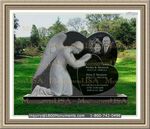|
What To Expect When Attending A Jewish Funeral
The rules of etiquette that apply to the burial customs of this religion have many similarities to all funerals. Jewish Funeral Etiquette dictates, as all funerals do, that it is a time to express sorrow. Family and beloved friends all talk about the good times they shared with the decedent.
The deceased is attended by someone from time of death till the last moments of the graveside service. The body is prepared for burial by being washed. During this preparation it is mandated that the body always face upwards.
Males complete the preparations for males. Females prepare the female decedent. Each individual is washed and then covered in a white shroud. Males are buried with prayer shawls that have a tassel removed. Everyone, rich or poor deserves a decent burial. By using simple garments for all, equal treatment and respect is assured.
The body is placed in a wooden casket allowing it to eventually be turned into dust. Those who mourn express it by rending their garments. This means they tear their outer clothing as an expression of their grief.
The decedent must be returned to the earth within 48 hours of passing away. According to Jewish custom, the casket is always closed. A rabbi prays in Hebrew. The family members may all contribute to delivering the eulogy.
Everyone is expected to listen and show a reverent attitude during the ceremony. It is considered appropriate to wear conservative, dark colored clothing. Casual wear, including sandals, is not acceptable.
In most cases, only family members attend the burial at the cemetery. They next sit shiva in the following week. Flowers are not brought to the family. Instead, those who visit to offer condolences bring gifts of food.
Casseroles and other prepared meals are brought to the family because they should not be burdened with cooking at this time. Jewish Funeral Etiquette includes visitors sharing an anecdote or two of times shared with the departed. This shows that the friend will not be forgotten.
|
|



























